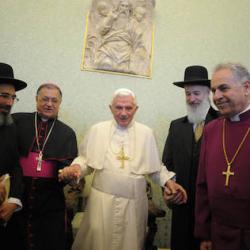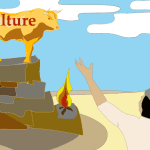Carl Trueman offers an irenic response to our conversation about the future at Protestantism last week.
One key difference between us is this: Carl thinks that unity is a “desirable” goal. I think that’s far too weak a way to capture the New Testament’s teaching. Unity is an evangelical demand. It’s not much of an exaggeration to say it is the evangelical demand.
When Paul discovered that Peter refused table fellowship with Gentiles, he didn’t say, “Come, Peter. Unity is desirable. Let’s hope that someday we can share a table. I doubt it, but we can desire it.” Paul’s words, as reported by himself, were: “I saw that they [Peter and the rest] were not straightforward about the truth of the gospel” (Galatians 2:14).
Peter’s behavior threatened the confession of justification by faith (2:16), a doctrine that Carl, like all Protestants, finds precious. Why should he want to threaten that doctrine by being complacent about the divisions of the body of Christ?
When Paul expounded his gospel in Ephesians, he claimed that the unity of the human race was the aim of Jesus’ death. Gentiles had been brought new by the blood of Jesus (2:13), since Jesus is our Peace who broke down the barriers that once separated Jew and Gentile (2:14) to make one new humanity (2:15).
Paul begins an exhortation based on this announcement in 3:1, but digresses to talk about his own ministry as a steward of the mystery. What is that mystery? Unity of the human race (3:6).
Paul gets back to the exhortation in 4:1, reminding the Ephesians that they share a sevenfold unity: one body, one Spirit, one hope, one Lord, one faith, one baptism, one Father (4:4-6).
The exhortation itself is to walk in a manner worthy of their calling (4:1). What calling? The calling to unity. Walking worthily of the calling to which we have been called means walking in humility, gentleness, patience, showing forbearing to one another in love (4:2-3). It means speaking truth in love, using our gifts to build up the body until it attains to the stature of Christ (4:15-16). It means putting away anger, bitterness, malice, clamor, being tender-hearted, forgiving one another as God in Christ forgave us (4:31-32). It means following Jesus in the way of love (5:1-2).
Does anyone think that relations between Protestants and Catholics (Protestants and Protestants, for that matter) have been characterized by humility, gentleness, patience, forbearance, love? Have Protestants always told the truth about Catholics (vice versa, of course)? Have Presbyterians put the best construction on Catholic doctrine and practice? Have we considered Catholics as more important than ourselves (and they us)? Have we really displayed the fruits of the Spirit in our dealings with one another? Have we displayed the unity for which Jesus went to the cross?
Carl is a church historian and knows that we haven’t (on either side). Shouldn’t we start doing what God requires? Shouldn’t we repent?
Mainly, Carl wants to know what he’d be getting himself into. He wants to know what peace and unity look like before he starts pursuing unity and peace. He wants to know if he has to give up his church. He’s counting the cost.
There’s wisdom there, but questions can become an excuse for staying still. Questions can become a mechanism of self-protection. Calculations can stand in the path of bold love. Do we know what’s being asked of us when we say “I do”? Do we know what sickness, poverty, “worse” might actually require of us? Not knowing what’s ahead is inherent in living a life of love.
Carl worries that he may have to close down his church. Jesus shed his blood to form one new man. Shouldn’t we be ready to make some sacrifices to make that unity a reality? But let me make it easy. I’m not calling for Protestant pastors to stop believing Protestant doctrine, or to shut down their Protestant churches. I’m talking about something as easy as stopping in at the closest Catholic church to get to know the priest there. Ask him what your church can do for his, how your church can pray for his parish. Ask if he’d like to meet to pray and study Scripture together once a month. Treat him as a brother. Treat him as one more important than yourself. Cultivate an adult relationship with Catholics. What will happen? Who knows?
What does peace look like? What does love look like? Every Sunday School kid knows the answer: It looks like Jesus, who is our peace, Jesus who is the incarnate Love of the Father, whose Spirit has been poured out to knit us into one. And He’s a Spirit we shouldn’t dare to quench.














